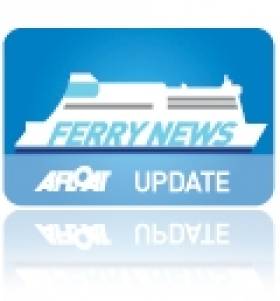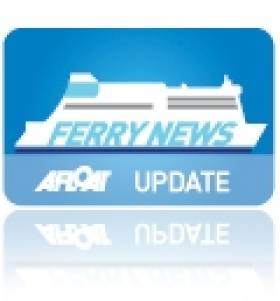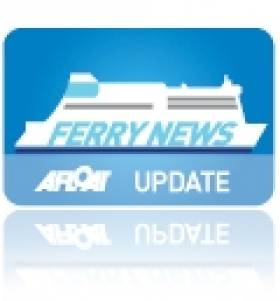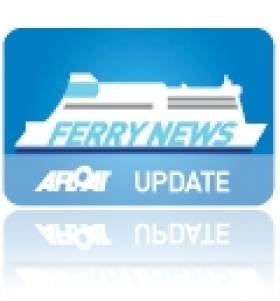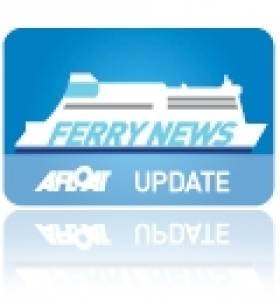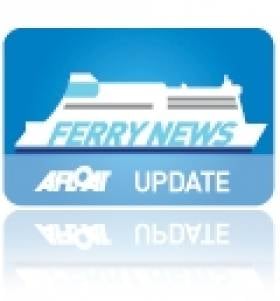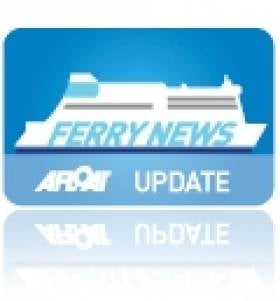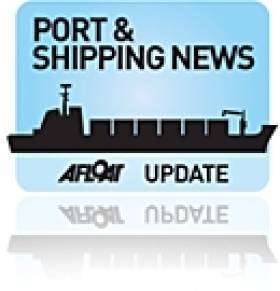Displaying items by tag: FreightFerry
#NewTimetable – The Belfast-Liverpool (Birkenhead) timetable of Stena Line's 'freight' ferry service operated by Stena Hibernia has been adjusted to better suit the needs of its customers.
The service will now start the week from Belfast at 15.00 on a Monday. The ferry company has identified Monday afternoon as a key sailing time for its customers and the vessel now departs from Belfast on Mondays at 1500hrs.
Richard Horswill, Stena Line's Head of Freight UK and Ireland said: "Stena Line introduced the Stena Hibernia in November 2013 to complement the Stena Lagan and Stena Mersey to help cope with increased demand for freight capacity on this route.
"We have had a fantastic response from our customers to the new service and I am delighted to report that this demand has continued. We are working with our customers to ensure we develop the service to meet their needs and with this in mind, the first sailing of the week will now leave Belfast at 15.00hrs on a Monday instead of 03.00hrs on a Tuesday from Liverpool," Richard continued.
The Stena Hibernia, which has capacity for 12 drivers and 110 unaccompanied units representing an additional 1,680 lane metre capacity, operates eight sailings per week, giving freight customers greater availability and choice.
Seatruck Newbuild Making Progress On Irish Sea
#FERRY NEWS -Seatruck Ferries newbuild freight-only ferry, Seatruck Progress carried out berthing trials in Dublin Port yesterday in preparation to her debut on the Liverpool route over the festive period, writes Jehan Ashmore.
This was the inaugural call to the capital, though she had sailed across Dublin Bay earlier this month (as previously reported - click HERE) during her delivery voyage to Liverpool from German shipbuilders FGS Flensburger.
At 142 metres long and with a beam of 24 metres, the four decked ro-ro vessel, offers more capacity to the routes existing pair of 'Point' class vessels, as she can handle an extra 35 trailer units (each of 13.5m) than the Clipper Point and Clipper Pennant.
In February, the newcomer's second sister out of four on order, Seatruck Power is set to join her on the central corridor route.
Seatruck are the only Irish Sea operator dedicated to the carriage of un-accompanied freight traffic, though the vessels can cater for driver accompanied units with a limited number of cabins.
New Vessel on the Horizon for Celtic Link Ferries
With an increased capacity of nearly 1,000 passengers accommodated in 428 cabin berths, the vessel will offer a wider choice of bars, restaurents and childrens' play area compared to the current route ro-pax Norman Voyager, which like her successor was built by Italian shipbuilders Visentini. The 25-knot replacement ship will have 2,285 lane metre space for 800 cars or 150 freight vehicles.
Celtic Horizon becomes the first vessel to incorporate the companies name since foundation in 2005 when the freight-ferry Diplomat started operations. In recent years the company has secured the contract to import new trade vehicles from French manufacturers.
Before the newcomer makes her Autumnal debut, the 2006 built vessel is currently operating as Cartour Beta while on charter to Caronte and Tourist's (C&T) Salerno-Messina service in Sicily. To read more click here.
As for the Norman Voyager, she first entered as a newbuild in 2008 for LD Lines weekend operated Rosslare-Le Havre route, subsequently transferred to Cherbourg. LD Lines first foray into the Irish market was short-lived as the ro-pax was sub-chartered to Celtic Link Ferries the following year, though the French company are to transfer the vessel to their Marseilles-Tunis route in November.
- Diplomat
- Celtic Link Ferries
- Ports and Shipping
- RosslareCherbourg
- Norman Voyager
- Visentini
- RoPax
- FreightFerry
- Ferry news
- LD Lines
- Cartour Beta
- Caronte and Tourist
- Visentini ropax
- RosslareLe Havre
- SalernoMessina
- MarseillesTunis
- Irish ferry market
- IrishFrench ferry services
- Irish ferry sector
- Irish Ferries
- RoPax Norman Voyager
- Rosslare Port
- Rosslare Europort
- French trade vehicles
- Citreon
- Peugoet
- Renault
Irish Sea 'Racehorse' Returns
Dawn Merchant and Brave Merchant represented the first pair of the 'Racehorse' class quartet of ro-pax sisters commissioned for the Cenargo Group. The quartet were built by Spainish shipbuilders Astilleros Espanoles SA in Seville, noting the first pair at 22,046grt where slightly smaller in tonnage terms compared to their 22,215grt counterparts Midnight Merchant and Northern Merchant. Upon delivery in 2000 the second pair were chartered to Norfolkline's Dover-Dunkerque route.
With a 130 truck capacity the Norman Trader can handle a marginally higher number of freight vehicles compared to the Norcape which handled 127 trucks. The Norcape, a 32-year-old freight-only vessel,was stood down in February and remains laid-up at Liverpool's Huskisson Dock. Incidentally, Norman Trader has joined one of her Racehorse class sisters, European Endeavour (formerly Midnight Merchant) which had directly replaced the Norcape on the central corridor route.
Likewise the European Endeavour is no stranger to the Irish route as for the last two years she has acted as winter relief vessel to cover the refits of the routes Dutch built ro-pax sisters Norbay and Norbank. The latter vessel is now undergoing a refit by Cammell Laird Shiprepairers in Birkenhead, now that the Norman Trader is in service to maintain the three-ship operated 8-hour route.
The Norman Trader had arrived into Dublin Bay last Friday from London's Tilbury Docks, on the next day she entered Dublin Port. In recent years she has operated on English Channel routes for the French shipping giant Louis-Dreyfus Armateurs through their ferry division LD Lines.
Norman Trader's (Dawn Merchant) sister Brave Merchant now renamed Norman Bridge also runs for LD Lines 'Motorways of the Seas' (MOS) route across the Bay of Biscay between Nantes /St. Nazaire to Gijón in northern Spain. The 14-hour route which started last year, which was run iniatially as a joint venture between Grimaldi Lines and Louis-Dreyfus and traded as GLD Atlantique.
- Dublin Port
- Bay of Biscay
- irish sea
- Ports and Shipping News
- Birkenhead
- Norcape
- RoPax
- DublinLiverpool
- Norfolkline
- FreightFerry
- Motorways of the Sea
- Norbank
- Norbay
- MOS
- European Endeavour
- Central Corridor
- P&O Irish Sea
- Norman Trader
- LD Lines
- Merchant Ferries
- Cenargo Group
- RaceHorse Class
- Tilbury Docks
- Cammell Laird
- Aintree
- Grand National
- Aintree Grand National
Stena's Southern Sailings
In the meantime freight-only ferry Stena Seafarer is operating the St. Georges Channel route having arrived at Rosslare on a repositioning voyage from Belfast on 29th March.
Stena Seafarer (1975 / 10,957grt) was one of a trio of freight-ferry sisters that served the Larne-Fleetwood port route until its closure in December. Like her sisters Stena Leader (1975 / 12,879grt) and Stena Pioneer (1975 / 14,426grt) they were built at the West German shipyard of J.J. Sietas in Hamburg.
Stena Seafarer's sisters remain laid-up in Belfast and with each vessel over 35 years in service it would seem likely there are nearing the end of their careers, at least on the Irish Sea.
To provide additional passenger capacity the Stena 'Express' fast-ferry service will return to the southern corridor route between 1 July-4 September. The high-season sailings as usual will be operated by the InCat built Stena Lynx III which is to operate a daily single round trip in tandem with Stena Europe.
Celtic's French Ferry Figures
Operating the route is the 2008 built ro-pax Norman Voyager, at 26,500grt, the vessel has a larger passenger capacity for 800 and additional facilities compared to the previous vessel, Diplomat. In addition the newer Italian built vessel has space for 200 cars and 120 trucks. The ro-pax has a service speed of 22.9 knots is claimed to be the fastest ship serving on the direct routes to France, taking 18-hours.
In 2005 the Wexford based company took over the route from P&O (Irish Sea) and continued to offer what was primarily a freight-only service served by the existing route vessel, the 16,776grt European Diplomat. The vessel was also sold to Celtic Link and renamed Diplomat and could only provide a limited passenger certificate for 74, which was mostly taken up by truck-drivers.
With the introduction in December 2009 of the chartered Norman Voyager from Meridian Marine Management, the Diplomat was laid-up in Waterford (click here). The 1978 built vessel was then chartered by Celtic Link to trade in the Caribbean Sea.
DFDS Seaways Makes Final Irish Sea Departure
The ro-pax Dublin Seaways made a last crossing with a Saturday morning arrival at Birkenhead. After disembarking passengers, vehicles and freight traffic, the 21,856grt vessel immediately departed the Mersey for a short-term deployment on the company's North Sea Rosyth-Zeebrugge service.
Sistership, Liverpool Seaways also completed her last crossing to Birkenhead with an overnight Saturday sailing. This was the final scheduled sailing under DFDS Seaways ownership and marked the last foot-passenger crossing on the Liverpool route as rival operators P&O (Irish Sea) and Seatruck Ferries do not cater for this market.
The vessel returned to Dublin yesterday from Birkenhead; this was to facilitate the loading of drop-trailers and terminal based tugmasters (engine-driven truck/cabs) that tow unaccompanied trailers on the roll-on roll-off vessels. After a short turn around at the terminal, Liverpool Seaways departed Dublin, bound for Immingham. The UK east coast port is where DFDS operate an extensive freight route network across the North Sea.
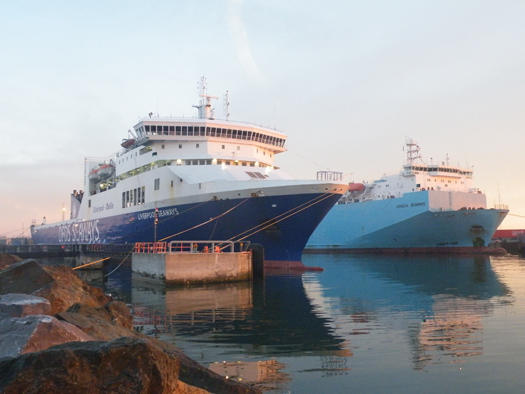
The ro-pax Liverpool Seaways and freight-ferry Anglia Seaways berthed in Dublin Port yesterday prior to sailing away from the Irish Sea. Photo Jehan Ashmore / ShipSNAPS
In addition the 13,704grt Anglia Seaways also docked in Dublin yesterday from Heysham to perform similar duties like the Liverpool Seaways. Several hours later, the 114-trailer capacity vessel set a southbound course past The Muglins, bound for Avonmouth.
DFDS cited its decision to exit entirely from Irish Sea sector due to the sharp decline in the Irish and UK economies in 2008 and 2009. The company suffered continuous losses on its remaining routes and the issue of over-capacity, particularly on the north Irish Sea.
Only last December, the Danish owned shipping operator sold its other two Irish Sea routes to Stena Line in a £40m acquisition deal. This is all the more remarkable considering DFDS Seaways purchased the previous route operator, Norfolkline's Irish Sea division of their four routes and seven vessels, in July 2010.
The sale to Stena covered the three terminals used on the Belfast routes to Birkenhead and Heysham, which is another freight-only service. In addition the acquisition involved the sale of the South Korean built freight-ferries Hibernia Seaways and Scotia Seaways; like the Anglia Seaways they were all former Norfolkline / Maersk Line vessels.
Interestingly the acquisition is to include the purchase of the chartered 27,510grt ro-pax sisters Lagan Seaways and Mersey Seaways. When the Visentini built sisters were completed at the Italian shipyard, they were placed on the Belfast-Birkenhead route in 2005.
On 1 December Stena Line UK Ltd acquired DFDS Seaways Irish Sea Ferries Ltd (since renamed Stena Line Irish Ferries Ltd). Although the acquisition of SL ISF by Stena Line has been completed and DFDS no longer owns SL ISF, Stena Line await formal approval from the Irish competition authority and the UK's Office of Fair Trading (OFT) to integrate SL ISF into the wider Stena Line business.
In the meantime during this transitional period, it is business as usual for customers using the Belfast-Birkenhead and Belfast-Heysham routes. Online bookings continue to be accepted on www.dfdsseaways.com or tel: (01) 819 2999 and in the UK tel: 0871 230 033
Ferry-Fallout as DFDS Exit Irish Sea
The routes represented a fifth of the freight market and will result in the withdrawal of the twin 21,856grt passenger ferry (ro-pax) sisters, Dublin Viking and Liverpool Viking on the 7-hour Mersey route and the 13,000grt freighter Anglia Seaways on the route to Lancashire.
In recent years, new tonnage notably in the form of four freight-only newbuilds commissioned for Seatruck Ferries on their Warrenpoint-Heysham and Dublin-Liverpool routes has added to intense competition in a crowded north Irish Sea ferry-freight sector.
The process to purchase Norfolkline's Irish Sea operations by DFDS Seaways was finally completed in mid-summer of last year. The acquisition saw the Scandinavian newcomer take control of four routes between Birkenhead-Belfast / Dublin and the freight-only Heysham-Belfast / Dublin services and a fleet of seven vessels, four (ro-pax) ferries and three freight-only vessels.
DFDS Seaways latest decision is all the more dramatic as the company in early December then sold both Belfast routes to Birkenhead and Heysham to Stena Line. In addition the £40m acquisition included the sale of the chartered 27,510 ro-pax sisters Lagan Seaways and Mersey Seaways and the 13,000grt freighter half-sisters, Scotia Seaways and Hibernia Seaways. The deal is significant in that Stena will make an inaugural foothold on the Merseyside market.
With the sea-changes swirling in the Irish Sea market, the dominant player is with out doubt Stena Line. The ferry operator closed late last year the Larne-Fleetwood route and three vessels (for more information about those vessels click here) yet the inclusion of the former DFDS Belfast-Heysham route is closely similar with neighbouring ports and newer larger vessels.
The acquisition by Stena of the loss making routes from DFDS last month also coincided with a review to be conducted by the Danish companies remaining Dublin routes to Birkenhead and Heysham. The findings of that review were concluded with this months' decision by DFDS to close down the routes, marking the Scandinavians operators brief foray on the Irish Sea ferry scene.


























